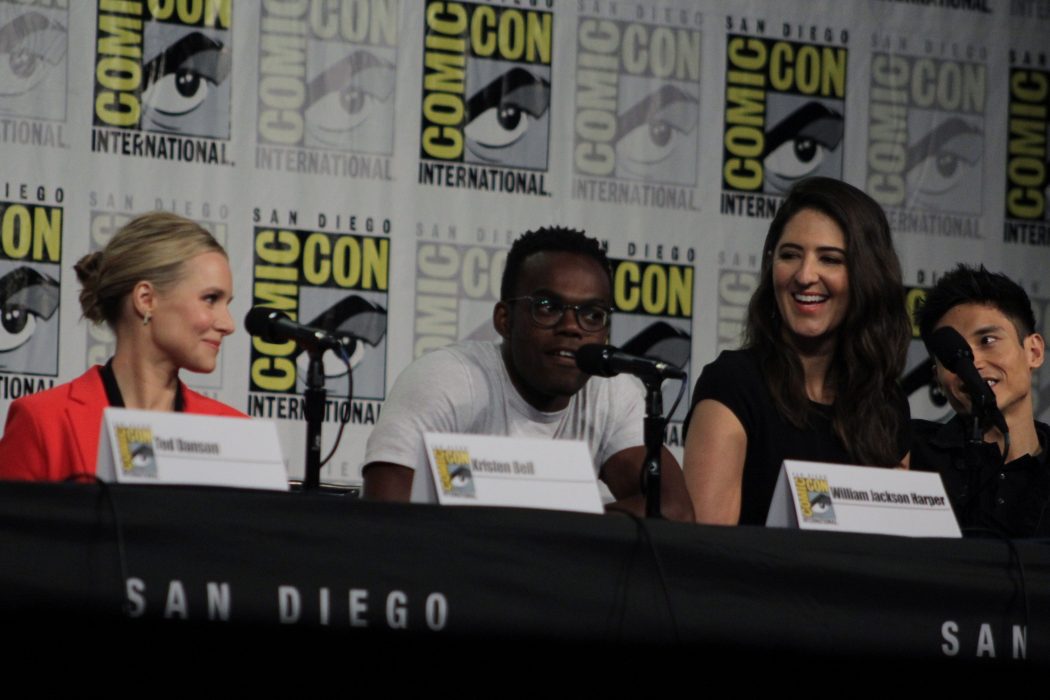In case you’ve been living under a rock, this article contains spoilers for The Good Place season three. The Good Place is a show that revolves around the lives of four individuals who had previously died, and are now being tortured in their own personal hell meant to appear like heaven. In this season, we see Eleanor, Chidi, Jason, and Tahani get another chance at life thanks to their tormentor-turned-ally, Michael, and the cosmic Judge. Once these four individuals realize that their new lives have become a game of chess between the powers of the Good Place and the demons of the Bad Place, they set up a plan. Their plan is to recreate Michael’s original imitation Good Place with new subjects to see if they can improve in the same way as the original four. When one of the new humans turns out to be Chidi’s ex-girlfriend, he decides to wipe his memory of her, and along with it, his relationship with Eleanor. All caught up? Let’s analyze.
“Are you Chidi…. Anna-Kendrick?” asks Eleanor Shelstrop to a professor of ethics and moral philosophy very clearly named Chidi Anagonye. Right from this opening scene, both Eleanor and the viewer have become pupils of ethics under Chidi’s tutelage. If there’s one thing a viewer will learn from watching The Good Place, it’s that everyone hates moral philosophy professors. And yet, as the critically-acclaimed NBC sitcom ended its third season in late January, the moral and ethical parallels the show had drawn between the hypothetical situations posited by professor Chidi and the real dilemmas faced by the show’s characters were striking.
As the narrative moves forward, so does the collective understanding of ethics within the group.
This season, the teachings of Aristotle, Plato, and Socrates had direct impacts on Eleanor and the gang’s behaviour. Producer Michael Schur offers clear thematic elements of philosophy that, once explored, add depth and dimension to the season. By centring the season around a lineage of three philosophers, each one the student of his predecessor before him, Schur reflects on the hereditary nature of knowledge between generations of learners, and the refinement happening therein. This is reflected in the heart-wrenching season finale, in which Eleanor must take up the respective mantles of architect and philosopher from Michael and Chidi, two of her inimitable mentors in the previous seasons. As the narrative moves forward, so does the collective understanding of ethics within the group. Mirroring the progression of philosophy as a field from the time of Socrates to the time of Aristotle, in their third season together the gang becomes vigilantly ethical and ultimately, Aristotelian.
Is there an intrinsic power to knowledge? How does knowledge relate to human concepts of truth or belief?
One of the favourite moral philosophers of the demon-dubbed “brainy bunch” is Socrates, considered by many to be the father of modern science, and philosophy in particular. The main point Chidi offers about Socratic philosophies of ethics are that they involve the utilization of questions and answers in the pursuit of justice. Fundamentally, Socrates posits this: “what I do not know, I do not think I know.” This claim of wholly pervasive “un-knowing” lends itself perfectly to the gang in the first few episodes of season three. Although Eleanor, Chidi, Tahani, and Jason are granted a second chance to live their lives by the Judge, this is upon the stipulation that they are not told of their mission to end up in the Good Place and that their actions must earn them enough points to get into this heavenly afterlife. However, a transformed Michael (with the help of Janet, his assistant who is essentially a humanoid Amazon Alexa) quickly turns to meddling in an attempt to coax the gang into coalescing. Michael knows that together these four humans can help each other make more sense of their un-knowing than they ever could hope to as individuals. This is hard for the viewer to reconcile, the ethical ramifications of Chidi and Eleanor debating whether an eternal soul exists whilst Michael and Shawn, the lead Bad Place demon trying to sabotage the gang’s experiment, fight over their eternal souls! This discordance allows Schur to naturally transition the characters into more Platonic theories of philosophy. A student of Socrates, Plato further refined the metaphysical nature of Socrates’ dual approach to philosophy. Epistemology, the branch of philosophy most widely associated with Plato, grapples with the concept of absolute knowledge. Is there an intrinsic power to knowledge? How does knowledge relate to human concepts of truth or belief? This expansion into metaphysical thought helps the gang transition easily from Platonic to Aristotelian schools of thought.
This season, Chidi lectures the gang on Aristotle’s ethical notions of “natural philosophy” and “practical philosophy.” According to Aristotelian principles, these two concepts are at odds with one another. As a student of Plato, Aristotle represents to some extent the epitome of Socrates’ theorizations of knowledge as a pursuit of justice. In the first episode of this season, Chidi explains to Eleanor the Aristotelian belief in “virtue ethics.” Essentially, this is the belief that virtue is practical. As Chidi puts it to Eleanor, “goodness isn’t something that a person just inherently has, it’s something that she achieves through her actions.” Although Eleanor is more concerned with the pronunciation of Aristotle’s name (complete with a Quebec-alienating Chipotle reference) than the content she is learning, this simple idea of virtue ethics is used as a beacon of moral righteousness for the third season in entirety. This is brilliantly shown in both extremes. In the extreme positive realm of virtue ethics, Chidi’s decision to sacrifice his love of Eleanor for the sake of science is an unquestionably moral act of selflessness. In the extreme negative realm of virtue ethics, Michael is so paralyzed at the thought of being untruthful that he is unable to act as the architect for the Judge’s experiment.
Another Aristotelian concept that seems to have been explored by Michael Schur in season three is that of Aristotle’s three types on friendships. It is posited that there are three distinct types of friendships: friendships of utility, friendships of pleasure, and friendships of the good. Throughout the season, and indeed throughout the show as a whole, the viewer is given the pleasure of seeing every relationship between the six main characters move from the least connected friendship to the most connected; that is, from friendships of utility, to friendships of pleasure, to friendships of the good.
One pervasive theme of this season was the student-teacher relationship. Both inside and outside the classroom, The Good Place hinges season three on the power dynamics of a relationship between a student and a teacher, both friendly and physical. The responsibility of carrying on the work of one’s mentor, such as Plato had to do to Aristotle and Eleanor to Chidi, is a task that only worsens as the mentor and mentee become closer. This example of an ethical dilemma seems especially salient today in the continental, even global context of the #MeToo movement. Even more so, the current university atmosphere surrounding student-professor relationships strikes a definite chord with this motif. What are the ethical boundaries present in a student-mentor relationship? Surely the lack of stark age difference sets Chidi and Eleanor apart from what might be considered a professor-student dichotomy. If Chidi and Eleanor are willing to erase the very essential existence of their love out of moral propriety, it makes one think seriously whether the morals of larger institutions in our world have become corrupt. Perhaps humanity at large could benefit from the example of one indecisive moral philosophy professor.








